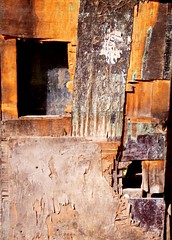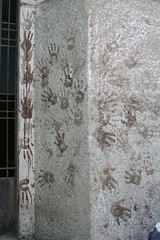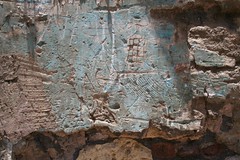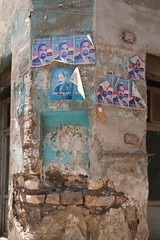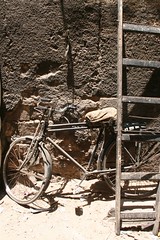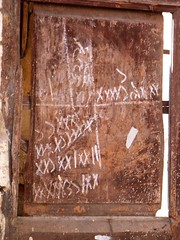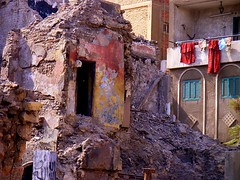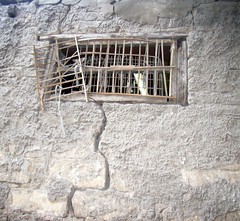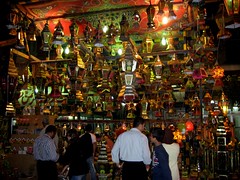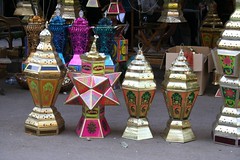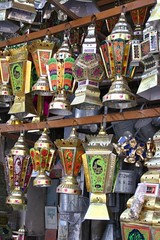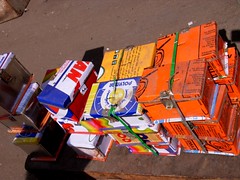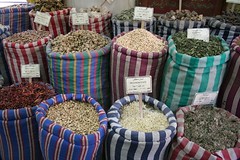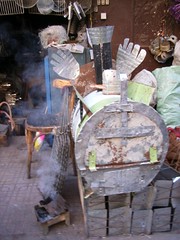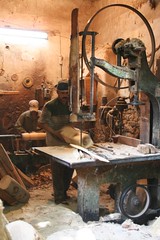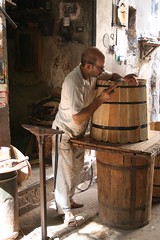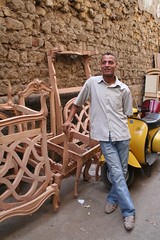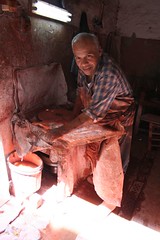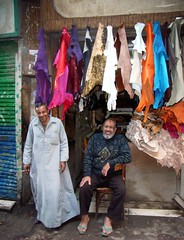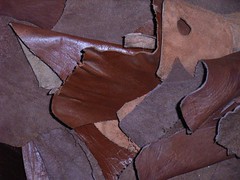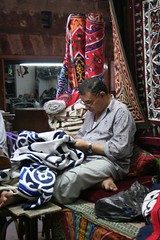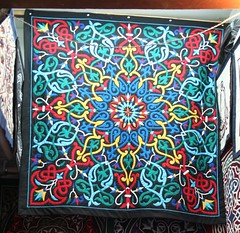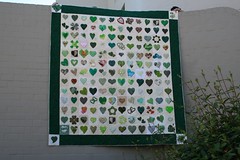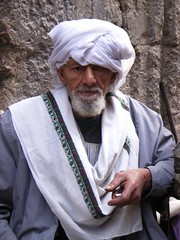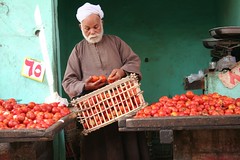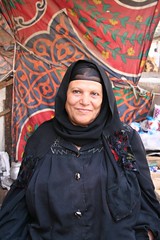There was a stage today where I thought dry wood touched to my face just might burst into flame.
It was 38 in Cairo today - and unusually quite humid. For those of you in the States that is 101 degrees. The sky looked blue if you looked straight up but when you flicked to the visible horizon it was oddly near - shimmery greyed-out buildings just on the other side of the Nile. It seemed an odd day to decide to walk up one of my favourite busy and heavily trafficked streets as it is angled at exactly the wrong direction for a shimmeringly hot day - so that nothing on either side really gives shelter from the sun at any point. However - I have a visitor with a camera and no place is better for photography than Cairo - and it was, after all, one of my favourite streets.
We start on Port Said Street, just opposite the stunning Islamic Musem. I badly want to see this. I started the posting quite hopeful when we tried to go in my very first month.
"Two months", they said.
Two months was fine - so we went again.
The guard on the door shook his head in sorrow. "Two months", he said.
It has been two months - ever since - and my time is running out. However, we have seen ladders hanging out of windows, and perhaps things are really happening. Maybe in two months I can get in.
I didn't even look this morning. My favourite walk starts at the jail. The doors had just opened and a river of women in black, some with several small children were flooding through the gates to visit their men in this low security prison. Many carried fruit and vegetables and food. Life is hard for women in this country who do not have a man to support them and I slipped a few pounds as baksheesh to a lovely young woman in black who had a baby in her arms, two tiny children, perhaps twins, clinging to her skirts and far too much to carry in tightly packed black plastic shopping bags that were obviously cutting into the hand she held out to me. She lifted her chin almost proudly and indicated the prison with a quick tilt of her head.
Baksheesh is a way of life here, and I tend to stock the side pocket of my bag with easily reached small notes.
This street is my favourite because it is full of the absolute best of Egyptian life. It is a street of craftsmen, and we zigzag down the narrow road flicking back and forward to the most interesting tiny shops. It is friendly, but not insistent in the way of the Khan Al Khalili on the other side of the main road.
I am digressing badly today, perhaps because it is well after midnight and I am waiting for another friend to arrive by plane - but I heard another wonderful spruiker line yesterday in the Khan. As I walked past one young man he said "Oh, you dropped..." and pointed quickly behind me.
I quickly turned to look, though I had felt nothing fall. There was nothing there. Well - actually there were a lot of bits of plastic, some paper drink cups and other rubbish, but nothing I had dropped. I looked at him, eyebrows raised.
"My heart" he said and clutched his chest.
Back to our walk. On the right side of the street is shop after shop selling marble and granite. It is stunning and cheap - but hardly the sort of thing you throw into your cabin luggage. A slab of deep green marbled in white about the size of a large kitchen bench top is about 65 Aussie dollars. Some of the men make inlaid tables, but many are making signs for offices and businesses. The flowing arabic script is pencilled in, then a sharpened concrete nail is belted along the lines with a hammer, cutting long smooth curves with a deeply incised sharp point at the bottom. This is filled with black enamel paint which is freely slathered over the whole surface. Then the surface is polished back, paint removed in the process except where it is in the deep grooves, and the sign is done. The men are grey with marble dust, and wear no protective gear at all.
We passed coopers making metal-belted barrels, saddlers with decorated saddles, plain leather saddles, and full complements of brass hands and bits to hang on jingling harnesses, an area where beautiful wooden bowls and rough furniture is turned on the spot from treetrunks delivered whole, tinsmiths making everything from stands for selling ful medammes for breakfast to rat traps - so many rat traps - what sort of comment is that on life in Cairo?
There is a marvelous machine that makes the finely shredded pastry for k'naffe. This looks like soft shredded wheat or the finest of vermicilli noodles. K'naffe is served in various forms all over the Middle East. It is a sweet often served as breakfast, but sometimes as a dessert as well. Imagine a stretching and buttery white cheese spread over a huge round flat pan. Cover this with the long strands of shredded pastry, finer than angel's hair pasta, and pat it down well. Drizzle it with butter oil - ghee - butter with the solids removed so it cannot burn. Bake over a low flame with a cover on top for about an hour. Then saturate the whole thing in a rich syrup flavoured with rose water. Scatter the now golden-orange top with dense green pistachios and cut into it. The pastry is crisp, the cheese hot and coming up in strings like mozarella, but the whole thing is hot and sweet, crisp and creamy and nutty with just a hint of tartness in the cheese.
If I walk you through at this rate I am going to take hours to get to Bab Zuweileh and the Tentmakers' Suq.
Bab Zuweilah is the one of the old gates of the old walled city of Cairo. There is a very tall and beautiful minaret on either side, and the whole collection of mosque, wall, outbuildings and gate date back to 1092 and that was a rebuild of a previous gate. Opposite is the Tentmakers' Suq where men sit and stitch the most stunning hangings, all applique, in bright clear plain cottons.
I have not been here for two months. While I have been in Australia Expertise Events (a large event organiser who hold the biggest Quilt and Craft Fairs in each State), have offered me space to hang a suitcase exhibition of work from the men here. There is a very large Quilt Convention in Melbourne in February next year, The Australasian Quilt Convention. I will be teaching quilting and lecturing on the men in this suq, and other textile places in Cairo.
I come here so often that I have many dear friends in this place. My friend and I had coffee, and tea, and orange Fanta (which I do not like)- all in different places. Business is not done in the Middle East the way it is in the West. We move straight into it. They sit and talk and enquire after the family. There is a deep and loving affection in the friendship offered by Arabs in the countires I have lived in. It is a closer bond than most western friendships, and I really felt that I had been missed, and was loved as we went from shop to shop, to be greeted with cries of "Miss Jenny, Miss Jenny". This is coming across as very 'memsahib-ish' - but it wasn't, I promise.
They were thrilled and overwhelmed by the Expertise offer. I so wish I had the funds available to bring at least two of the men with me and with the exhibition, so one of the older men who is a truly brilliant applique worker could sit and sew to show people what can be done with some bright fabric and the most basic of tools, including bent needles and cast iron sheers a good fourteen inches long. The man I would like to bring has no English, but his son is good and fluent, and could answer questions and explain the techniques. There are three boys (well, maybe mid-thirties down to late twenties) and I would leave it to them to sort out which of them would come.
If anyone has any ideas on people who might have access to some sponsorship - two fares to Australia from Egypt and accommodation there for six or seven days - please let me know. This is nothing at all to do with the Australian Government and I doubt if the Egyptian Government would see an advantage in backing something on such a small scale.
The other thing I did today was something I have meant to do for ages. Just before I left in such a rush for Australia I had put a lot of my favourite 'people' photos on CD and taken them to be printed. From this I had selected the photographs taken in this area and I had them in my bag.
We walked beyond the Tentmakers' into areas where tourists rarely find themselves.
Outside one fairly old and scruffy mosque is an old man who sits there at all hours with a young girl who obviously has Down's Syndrome. He is very old, blind in one eye and it is clouded and opaquely white. He has the most wonderful face, autocratic and austere and he wears marvelously dignified deep blue robes with a white draped turban style head dress. The photograph on top was a portrait shot of him and because I knew exactly where he was I went there first.
I approached him, he recognised me and started to raise his hand to acknowledge me. I held up the photograph and he squinted a bit with his single eye then realised what it was. I thought he was going to cry, he was so thrilled. He took my handsin both of his and held them tightly. He picked up his photograph (which had fallen when he grabbed me) and started to run around showing it to his friends nearby. His smile was a mile wide. He took the stool he usually sits on, grabbed my hand and marched me with the stool to a small 'shop' - like a little fabric surrounded shelter on the street.
There was a woman there who looked at the photo, grinned and exclaimed, and who was so excited she could only have been his wife. The stool was carefully placed in the shade, and covered with a piece of newspaper and it was made very clear that I was to sit. Another was put beside it for Rod and he sat down too. There we stayed while half the neighbourhood crowded around to see the photo.
At about this point I pulled the rest out of the bag and offered them to my old friend's wife. She started flipping, getting more and more excited as she recognised people and consulted with the seven or eight able to get their heads close enough to decide if it really was Um Ambdullah, or Abu Mohammed. Then she found herself. I didn't even realise it was her, different clothes and colours and pose, but there was no doubt when I looked at it. She kept giving little jumps and yelps in absolute excitement.
Somehow it puts into perspective the poverty and pride of this area that a photo of yourself - something most of us have lots of in the west, could create such utter joy. I had not really thought about it but most of these people would never have a photo, would never own a camera or even really know someone with a camera.
I made 'we must go' motions. No, we were quite firmly pushed back.
We waited a while, and then the reason for the wait arrived. He had sent for two bottles of 7-Up, which probably cost him a few days salary. He opened them carefully with a bottle opener he had to borrow (old crown seals here) and they didn't have anything, then watched with a smile as we drank them. It was incredibly touching.
It is now after two and my friend has arrived from the airport. So - in haste and some weariness - that scene repeated again and again as we moved around handing out photos - and it was exhilarating and marvelous. We also took lots more photos with people avid to have their's taken.
So - I will go back again one day.

